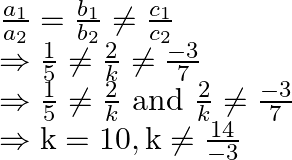Solution:
The given system of equations:

And, ![]()
The equations are of the following form:
![]()
where, ![]() and
and ![]()
(i) For a unique solution, we must have:
![]() that is,
that is,![]()
Therefore for all the real values of ![]() other than 10, the given system of equations will have a unique solution.
other than 10, the given system of equations will have a unique solution.
(ii) In order that the given system of equations has no solution, we must have:

As a result, the required value of ![]() is 10
is 10
There is no value of ![]() for which the given system of equations has an infinite number of solutions.
for which the given system of equations has an infinite number of solutions.
